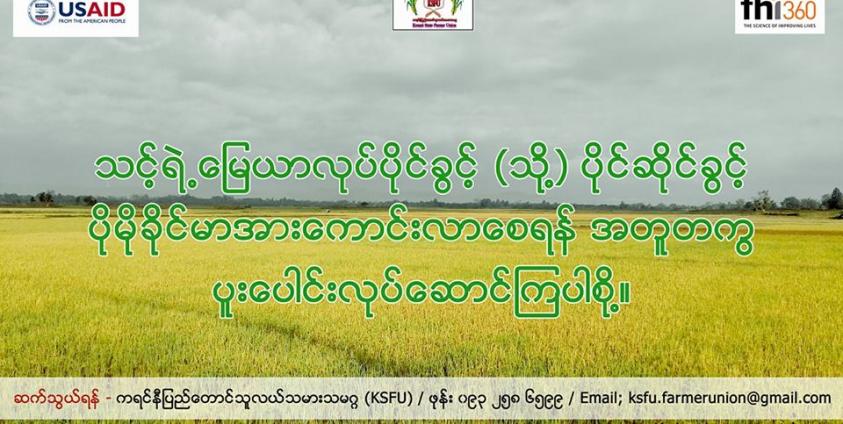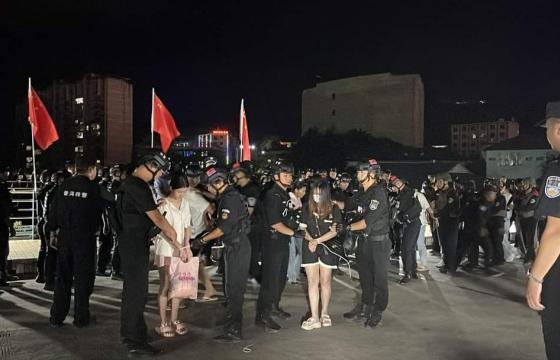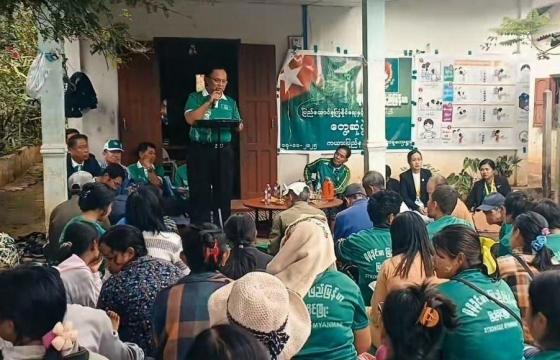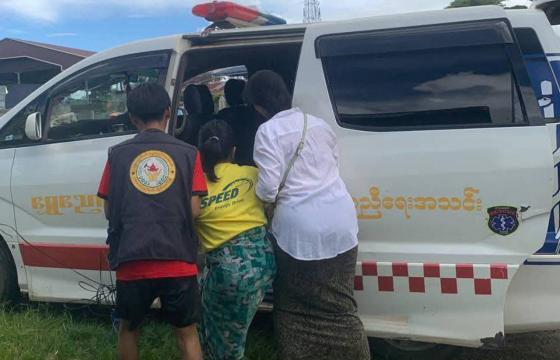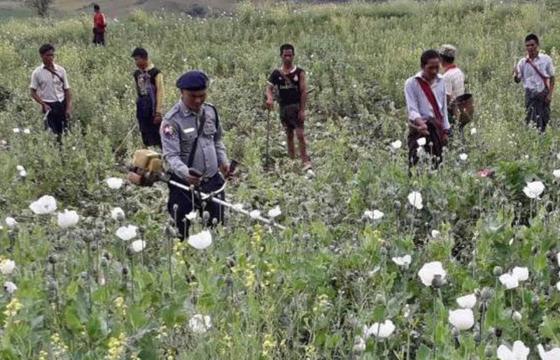On August 20, a 45-page “Federal land administration still a long way in the country’s land reform sector report” was released by Kayah Human Rights and Environmental Rights Movement Network, in Yangon at Orchid Hotel.
The report emphasized that following the September 2018 amendment on “Vacant, Fallow and Virgin Land Management Law (VFV Land Law)” land confiscation disputes have dramatically increased in Kayah or Karenni state.
Accordingly, the new law demands that these people must now apply for 30 year concessions to use their own land. In legal point of view, if they fail to do so and another group such as a company or any entity that is awarded land title of their land, they may face up to two years of imprisonment for trespassing. Most of the lands classified as VFV are in rural ethnic states’ areas and up to 10 million people live or rely on these lands for their livelihood.
“While the amendment does exclude land being used under customary tenure from being classified as VFV, the law provides no definition of customary land or any procedure by which communities can register their land as customary,” wrote Namati, a movement of grass roots legal advocates worldwide group, in its report “Most Farmers Do Not Know about the Vacant, Fallow and Virgin Land Management Law as the Grace Period to Register Closes”.
Accordingly, as the report’s title suggests the ethnic farmers’ either really don’t know or refuse that their land to be classified as VFV land and stick to their traditional customary land ownership, with negative consequence on their own welfare.
This angst for backlash by ignoring the ethnic customary land law and the feared consequence of government and ethnic nationalities conflict has now become a reality, with full-blown political disagreement spilling out into the public domain in Karenni state.
Saw Eh Say negotiator of the Kayah Human Rights and Environmental Rights Movement Network explained the aim of report as: “This report has aims. The first three core objectives (to tackle) for the country are: (resolving) land use issues; national reconciliation; and (achieving) genuine democratic federal union. The three objectives have been pursued by successive governments, while saying that they are approaching these objectives, the real situation is totally going in the opposite direction, which we would like to portray with this report.”
Recent development
According to Karenni State Farmer Union (KSFU) there are some 50,000 acres of confiscated land in Karenni state, which the majority is undertaken by the military, also known as Tatmadaw and Myanmar army, governmental agencies and economic entrepreneurs.
“I wanted to highlight and portray that it is confiscation. Before it was confiscated but not too transparent. Later when the farmers knew more about land rights and laws and assessed the situations, they realised that their lands were being confiscated,” said the KSFU Chairman Khu Tu Reh.
“If we calculated the exact acreage it will be about 50,000 acres. There are also confiscation after 2010, which mostly are for building military camps by the Myanmar army,” he added.
Reportedly, land confiscations are mostly in Loikaw, Hpruso, Demoso townships. Besides, indigenous lands are being marked as protected forest and Tatmadaw land confiscations are occurring most in Karenni state said the locals, civil society organizations and political parties.
Dawmukala village of Loikaw township and Dawsoshay village of Demoso township farmers have appeared before the court on August 5 because of Tatmadaw’s lawsuit against them regarding land disputes.
Dawsoshay farmer, Ko Mar expressed her worries saying: “I’m worried of the lawsuit as it concerns my livelihood. I’m uncertain, losing orientation on what to do next and very worried. I only have this small farm and no other job or income. That’s why I wanted to get back this farm. I rely on this farm like my parents as it pays for my sons and daughters education, livelihood, societal duty expenses and everything,” according to the Network Media Group recent report.
Kayan National Party Chairman Hkun Be Htoo said: “Because land confiscation of the military, one third of the population have been affected with loses. Almost every town is not free from land confiscation and a lot of farmers lost their farms. Now their livelihood become problematic. That’s why military’s land confiscations are really bad for the farmers.”
Kayah Human Rights and Environmental Rights Movement Network report called upon the authorities to stop the land confiscation, suing the local people and arresting them as they affect their livelihood, security and peace.
In fighting back, desperate Karenni farmers have staged silent demonstrations, ploughing demonstrations and planting on their confiscated lands continuously, during June and July, in a bid to get back their lands.
Reportedly, the farmers were slapped with penal code paragraph 427 causing mischief by damaging; paragraph 447 criminal trespassing; paragraph 353 using criminal force against public servant; and paragraph 61 destroying public property.
KSFU said that now 27 farmers, some in prison and some outside of it, from Dawmukala village of
Loikaw township and Dawsoshay village of Demoso township are facing lawsuit at the court, where they have to appear weekly.
Besides, one record taker and also state parliament committee member from Loikaw town, who was gathering facts accompanied by a farmer whose land was confiscated and has tried to regain it back, were both arrested under paragraph 6 destroying public property.
On August 22, KSFU issued its position statement stating:
- The Tatmadaw instead of protecting the country, people’s lives and properties, is confiscating land from farmers, planting crops and fencing, which destroy national unity and peace.
- Further, the forcibly arresting of the farmers, without transparency, are against democratic norms and also destroying the democratic system.
- Suing farmers, media workers and sympathizers using various paragraphs (laws) is not correct and only misusing the power.
- And finally demanding to stop land confiscation, undertaking plantation, fencing the confiscated lands and suing the farmers should be thought over and bring them all to an end.
Analysis
Looking at the unfolding scenarios in Karenni state, one could only confirmed that the government land policy reform has undoubtedly failed.
The latest Transnational Institute report quoted one Karenni Internally Displaced Person (IDP) and refugee on 21 August 2019 as saying: “After the VFV law amendment, over 50 acres of land in Hpruso were registered under the name of a Burma (Myanmar) Army commander. These laws should be for the people, but now they benefit only a small group of people.”
Moreover, the amended VFV Land Law of September 2018 has wiped out the ethnic customary land ownership law, which has brought miseries and hardships to the ethnic farmer population, as is evident by many ongoing cases in Karenni state.
However, this is not only limited to the farmers in Karenni state. The same problem is arising in all ethnic states and will exacerbate once hundreds of IDP and refugees fleeing the armed conflict in Kachin, Shan and Karen states all return to claim their customary ownership of the lands they left.
Some farmers in Karenni state are so desperate that they may even be thinking of armed struggle as their livelihood, which is dependent on land, have been taken away, said KSFU Chairman Khu Tu Reh very recently.
Thus, the government should accommodate the ethnic nationality farmers’ traditional customary land ownership for now and let the individual ethnic state decide for itself in the future, as the country is trying to move towards federalism.
Furthermore, promulgating such sweeping amendment law on land reform, without the consent of the ethnic nationalities, may be breaching the Nationwide Ceasefire Agreement (NCA), which is already officially endorsed by the parliament during Thein Sein’s presidency.
Accordingly, in NCA Chapter 6 “Confidence building measures,” phrases like environmental conservation; efforts to preserve and promote ethnic culture, language, and literature; and matters regarding peace and stability, and the maintenance of rule of law in the said areas (ethnic areas); are to be carried out and observed by the government and the Ethnic Armed Organizations in coordination.
Seen from this point of view the National League for Democracy government may be breaching the NCA endorsed by the parliament and should be given a second thought of correcting its failed land reform policy.


